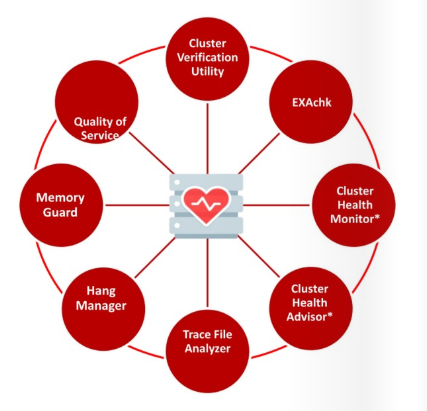Trusted by Global Brands
Why ADW?
- 1It is built on Oracle Database, that has automatic Datawarehouse procedures.
- 2It is easy to use as all the management tasks are automated, all configuration and tuning tasks are fully automated. All data is automatically compressed and encrypted.
- 3It is fast since its built on Exadata and Oracle database. It also offers instant elasticity on computing and storage dimensions. When it comes to elasticity, the user can choose the exact amount of storage and CPU as needed. Later when more CPU's are required, one can Scale Up or Scale down.
- 4Machine Learning enables continuous optimization.
- 5ML in ADW delivers an excellent query performance. Since its built-on oracle database, every business intelligence and Data Integration Services that are compatible with Oracle database supports this service out of the box. For development purpose, existing tools or a newer version of SQL developer (which supports ADW) can be used.
- 6ADW Patches all software online at all levels (security, OS, network, database) while the system is running.
- 7SQL plans- same types of SQL queries might run differently based on several dependencies such as data volumes, number of users on the system. ADW does not create indexes on initial instance creation. The indexes are built on the fly after auto query analysis. Index intelligence module drops and creates new indexes on the fly to continuously optimize the query performance which is Auto indexing and auto partitioning.
- 8It also provides an option for database administrators to override the auto decisions in business scenarios where one would want to give more priority to some critical processes such as month end close process during the beginning of each month.
During the initial provisioning phase, the customer provides details such as datacenter location, CPU and memory requirements, and login credentials. Once provisioned, data is automatically loaded and compressed, and statistics for the data are created. There's no need to manually set up infrastructure or manage database tablespaces. The system handles all OS and SYSDBA operations, automatically rectifying errors in SQL and running them. The database is fully secured, protected, and encrypted, with automatic recovery in case of failures such as storage, networking, or compute issues. For instance, in the event of an SQL query failure, a recovery window is provided for manual restore.

ADW Features
- 1Scale-Up and Scale-Down of compute +Storage. ADW has the ability to scale's up /scale down with automated steps. The pricing is based upon CPU ($/CPU/Hour) and storage ($/TB/Months).
- 2Compression Everything in ADW is Compressed using HCC (facts and dimensions). 3.5 to 5 times compression as compared to Amazon RDS as Amazon uses columnar instead of HCC compression. ADW enables huge results caching. Autonomous database results in fewer indexes (by up to 60%) to yield better concurrency support.
- 3Cluster Advisor/Manager Oracle cluster health advisor continuously monitors Real Application Clusters(RAC) databases for performance and availability issues.
- 4Memory Guard Memory Guard is an Oracle Real Application Clusters (Oracle RAC) environment feature to monitor the cluster nodes and prevent node stress caused by the lack of memory.
- 5Hang Manager Hang Manager is an Oracle Real Application Clusters (Oracle RAC) environment feature that autonomously and reliably detects and resolves hangs and deadlocks. It keeps the resources available. Hang Manager is enabled by default.
- 6Quality of Service Oracle Database Quality of Service (QoS) Management adjusts the system configuration to keep the applications running at the performance levels needed by your business. It monitors and delivers Key Performance Indicators. It provides cluster-wide dashboard and phase in with the measure.
- 7Cluster verification(Cluster Configuration) Use configuration audit tools Oracle ORAchk and Oracle EXAchk to assess your Oracle Engineered Systems and non-Engineered Systems for known configuration problems and best practices.
- 8Data Lake Data from different sources and different formats (structured and unstructured) can be processed. ADW workloads- Data warehouse, Data Mart, Data Lake, Machine Learning.
Your Vision, Our Expertise
Elevating Your Software Product Engineering Journey with Vast Edge



